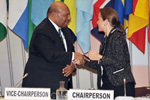8 November 2008: Participants to the 44th session of the International Tropical Timber Council (ITTC), which was held in Yokohama, Japan, from 3-8 November 2008, discussed developments under the UN Framework Convention on Climate Change (UNFCCC) regarding forests and their potential implications for tropical forests and the world tropical timber economy, but did not adopt […]
 8 November 2008: Participants to the 44th session of the International Tropical Timber Council (ITTC), which was held in Yokohama, Japan, from 3-8 November 2008, discussed developments under the UN Framework Convention on Climate Change (UNFCCC) regarding forests and their potential implications for tropical forests and the world tropical timber economy, but did not adopt a decision on this agenda item.
8 November 2008: Participants to the 44th session of the International Tropical Timber Council (ITTC), which was held in Yokohama, Japan, from 3-8 November 2008, discussed developments under the UN Framework Convention on Climate Change (UNFCCC) regarding forests and their potential implications for tropical forests and the world tropical timber economy, but did not adopt a decision on this agenda item.
8 November 2008: Participants to the 44th session of the International Tropical Timber Council (ITTC), which was held in Yokohama, Japan, from 3-8 November 2008, discussed developments under the UN Framework Convention on Climate Change (UNFCCC) regarding forests and their potential implications for tropical forests and the world tropical timber economy, but did not adopt a decision on this agenda item. Presenting on this topic, Jürgen Blaser, ITTO consultant, explained that the role of forests in the second commitment period is under negotiation, noting that large amounts of funding are available for reduced emissions from deforestation and forest degradation (REDD). He emphasized the potential complementary role of the ITTO, using its institutional capacity to inform and assist the UNFCCC, and said the UNFCCC could contribute additional funding towards ITTO’s reforestation and rehabilitation activities.
In the subsequent discussion, Brazil stated that the ITTO’s mandate does not cover climate change, while other countries highlighted current and potential roles for the ITTO on climate change, including: monitoring carbon stock changes (the Philippines, Papua New Guinea); developing the Collaborative Partnership on Forests’ strategic framework and a forest restoration Thematic Programme (Switzerland, Liberia); capturing funds from carbon markets and/or payment for environmental services from commercial forests (Colombia, Cameroon, Papua New Guinea); and conducting global reviews of best practices (Indonesia). The EC announced potential long-term resources from emission trading schemes to halt deforestation. Blaser said the ITTC can encourage incentives for harvesting wood sustainably and that developing countries can access funds and mitigate climate change without making commitments. Although ITTC-44 Chair Katharina Kuehmayer (Austria) called for a decision on this topic, no agreement was reached.
ITTC-44 approved the creation of several new thematic programmes, including one on Reducing Deforestation and Forest Degradation and Enhancing Environmental Services in Tropical Forests, to which the Government of Norway pledged US$3.5 million. Funds were also pledged to assist ITTO member countries in formulating and implementing an integrated forest-sector response to climate change. [ITTO
Press Release] [IISDRS
Coverage]